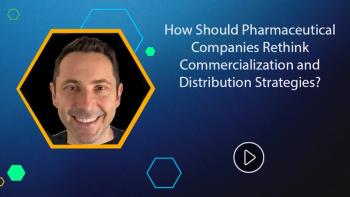
How Pharma Marketers Can Thrive in a Cookie-Less Era: Q&A with David Minkin
David Minkin, President & GM at epocrates, offers his insights into the importance of trust, first-party data, and strategic partnerships in ensuring successful marketing campaigns.
In the Q&A below, David Minkin, President & GM at epocrates, shares his expertise on the evolving landscape of digital advertising in the pharmaceutical industry amidst the deprecation of third-party cookies. From discussing the challenges faced by pharma and brand marketers to providing strategies for navigating the cookie-less future, Minkin offers his insights into the importance of trust, first-party data, and strategic partnerships in ensuring successful marketing campaigns.
Can you discuss the evolution of third-party cookies and their impact on pharma marketers?
Initially, some of the original use cases for cookies were introduced to track, optimize, and report on online user behavior. However, due to growing privacy concerns and stricter security regulations, not to mention a desire by walled gardens to blunt competition, major web browsers – like Safari and Firefox – have already blocked the use of third-party tracking cookies, and now, Google Chrome is following suit. An
It’s important to note all buyers in the digital media ecosystem will be impacted by this change. With the deprecation of third-party cookies, measurement, targeting, and frequency-capping will become more challenging for buyers. This is where collaboration with trusted partners or publishers with a strong brand history becomes crucial, as audiences are more likely to engage with and pay for content they perceive as valuable.
For pharma marketers moving forward, it’ll be critical to either focus on collecting propriety first-party data and building direct relationships with consumers to maintain personalized advertising capabilities, or work with trusted publishing partners who already have these direct relationships with consumers, all while respecting user privacy and complying with regulations.
What broader implications will the deprecation of third-party cookies have on the digital media advertising industry, and how should pharma marketers/buyers prepare?
Beyond immediate challenges – measurement, targeting, and frequency capping – the digital advertising world is gravitating towards more trustworthy partnerships with premium publishers. These are publishers who provide marketers with trusted content and leverage first-party data as opposed to third-party data. For pharma marketers, this means forming strong relationships with publishers who leverage data gathered directly from their website visitors. Although the transition to this model may initially pose some challenges, particularly in recalibrating targeting strategies and figuring out new ways to reach specific groups without relying on traditional tracking methods, the long-term focus is on building trust with consumers and ensuring ethical advertising practices.
To prepare for this shift, it is essential leaders reconsider their buying strategy. The key is shifting towards trusted partners, i.e., premium publishers who have both a strong brand and original content that an audience finds valuable, and that offers high-quality inventory. Buying through open exchanges or marketplaces can lead to issues such as appearing on low-quality platforms or alongside inappropriate content; therefore, my strong advice is to move away from open exchanges and instead work closely with trusted publishers, exercising caution and diligence in selecting where to place your ads.
How can brands identify and cultivate relationships with these premium publishers and what benefits do these partnerships offer in a cookie-less future?
The first step in this process is thorough research and due diligence. Brands should seek out publishers with a strong reputation, a history of delivering quality content, and high audience engagement. For instance, a publisher like epocrates, which has been around for over 25 years and has over one million active users and 100,000 paying subscribers, exemplifies a trustworthy source with high audience value of HCPs. It’s essential to ensure that the publisher’s content is not only high-quality but also relevant and valuable enough to attract and retain target audiences.
Cultivating these relationships involves direct engagement to establish long-term partnerships. Working with premium publishers fosters transparency and trust, allowing for collaborative planning and strategy development. By sharing insights and working closely together, both parties can optimize campaign performance and better target their audience.
Looking ahead to a cookie-less future, these partnerships offer several benefits. First and foremost, first-party data from trusted publishers allows for more precise audience targeting and accurate campaign measurement, addressing the challenges posed by the deprecation of third-party cookies. Additionally, the provenance of first-party data is superior, providing more reliable and actionable insights compared to third-party data. Partnering with reputable publishers also enhances brand safety, ensuring that ads appear in trusted environments, which boosts consumer trust and creates a positive halo effect. These publishers are more likely to have robust privacy practices, ensuring compliance with data protection regulations and maintaining user trust.
How might the use of AI-powered tools address some of the challenges posed by the cookie-less future, particularly in terms of personalization and compliance?
AI – the topic we can’t get enough of! When it comes to AI in this instance, it’s about leveraging the technology to enhance both personalization and compliance in their advertising strategies.
One key advantage of AI is its ability to perform dynamic creative optimization. This means ads can be updated in real-time based on contextual factors such as weather or user location. AI can also be used to optimize the targeting and placement of ads to drive better performance. AI excels at optimizing campaigns to drive engagement. For example, major publishers like The New York Times and The Wall Street Journal, where I formally worked, have adopted AI-powered optimization tools, showcasing their effectiveness in improving ad performance.
Another advantage is that AI has the power to sift through and analyze data with incredible speed and accuracy. By leveraging advanced algorithms and machine learning techniques, AI can analyze diverse data sources, including first-party data, user interactions, and contextual signals, to uncover valuable insights about consumer behavior and preferences. In the context of the impending third-party cookie deprecation, AI serves as a useful tool for marketers to compensate for the loss of traditional tracking mechanisms.
How can brands effectively communicate their commitment to privacy and transparency in their advertising campaigns, especially to healthcare professionals and patients?
When it comes to communicating about privacy and transparency in their advertising campaigns, especially to healthcare stakeholders, brands need to work with trusted publishers and partners. By collaborating with publishers who have established a strong trust relationship with their audience, brands can benefit from a halo effect, where the positive sentiment towards the publisher extends to the advertiser. Placing ads on reputable medical journals, professional healthcare websites, and trusted patient resource platforms signals that the brand values integrity and reliability.
Additionally, partnering with well-known and respected organizations in the healthcare industry can further convey a brand’s dedication to privacy and transparency through the credibility of these associations. It is also crucial to ensure that ads are strategically placed in contexts that are both relevant and trusted by the target audience, such as medical education platforms for healthcare professionals and patient advocacy sites for patients or in apps like epocrates. Avoiding placements in mistrusted spaces is equally important, as it helps maintain the brand’s message of commitment to privacy and transparency. By focusing on these strategies, brands can enhance their credibility and effectively communicate their dedication to privacy and transparency to healthcare professionals and patients.
What advice would you offer to pharma marketers who are currently grappling with the implications of the cookie-less future, including actionable next steps for success?
In light of the evolving digital landscape and the impending challenges posed by the cookie-less future, my advice to pharma marketers includes multiple factors:
- Hone first-party data: As we’ve talked about, prioritizing the utilization of first-party data is essential, as it ensures reliable targeting and measurement capabilities in the absence of third-party cookies.
- Build trust first: This is critical among all stakeholders – from buyers to sellers and publishers to audiences – it is necessary, and this involves transparent communication about data practices and ensuring ads are placed in trusted environments.
- Along these lines, work with trusted partners: Placing ads willy-nilly will not serve your brand well. Work with partners who already have strong trusted relationships with their audiences and thus can leverage first-party data on your behalf to drive performance.
- Don’t be afraid of change: Pharma marketers will need to adapt their buying strategies to align with the changing digital landscape. If your digital pharma marketing strategy currently heavily relies on third-party cookies, it’s obviously time to rethink your approach. This may involve shifting towards trusted partners and premium publishers to mitigate risks associated with the open marketplace.
- Don’t shy away from tech: Utilizing AI’s data analysis capabilities is a way to ensure success. As we know, AI can handle various types of data in different formats. Through gathering real-time user data such as search history, preferences, demographics, and even weather details, AI can study user behavior, detect patterns, and tailor ad recommendations to match users’ current interests.
All in all, success in the cookie-less future hinges on embracing innovative strategies, fostering trust, and leveraging trusted partnerships to stay ahead of the curve.
Newsletter
Lead with insight with the Pharmaceutical Executive newsletter, featuring strategic analysis, leadership trends, and market intelligence for biopharma decision-makers.




